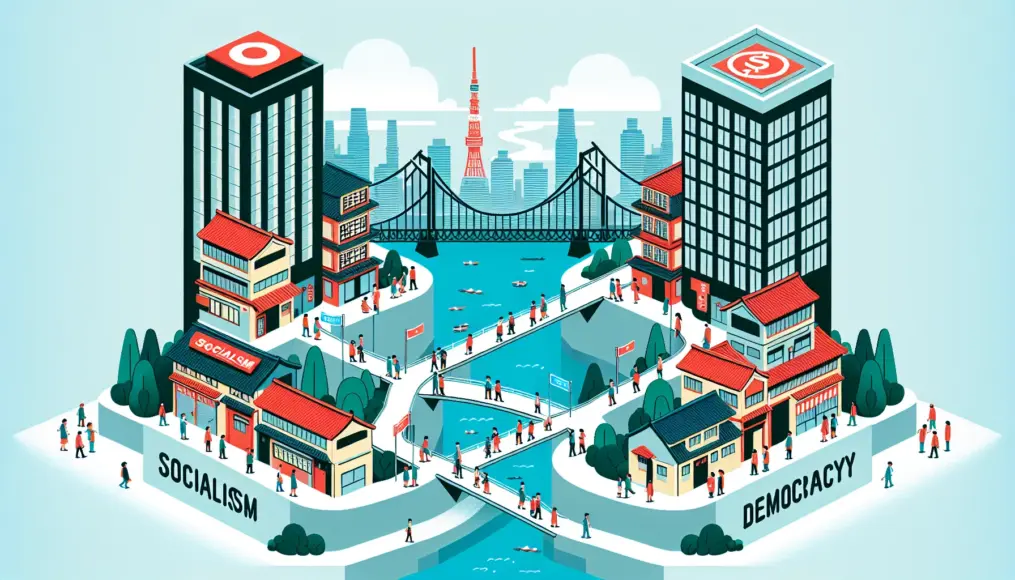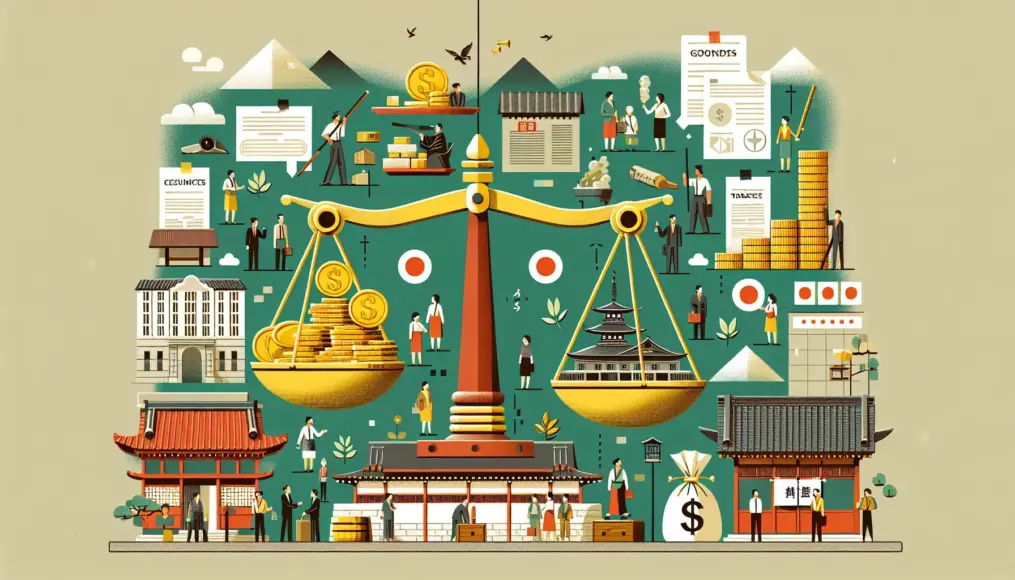The political ideologies of socialism and democracy have often been seen as opposing forces throughout history. However, in today’s society, there is a growing interest in the potential for these two systems to coexist. It’s becoming increasingly clear that we need to think beyond the traditional frameworks of socialism and democracy to envision new political structures. In this blog post, we will delve into the historical backgrounds and fundamental principles of both ideologies, exploring how they might fuse together in innovative ways.
By contemplating this theme, we can deepen our understanding of future political systems and perhaps find inspiration for building a better society. Join us on this journey to uncover surprising possibilities for coexistence.
- Investigating the historical backgrounds of socialism and democracy
- Understanding the theoretical differences between the two
- Analyzing contemporary success stories and their implications
The Historical Context of Socialism and Democracy
Socialism and democracy, while rooted in distinct political philosophies, have influenced each other throughout history. Emerging in the 19th century as an ideology seeking economic equality, socialism has been tested in various experimental forms across many countries. In contrast, democracy emphasizes individual freedom and rights, operating on the premise that citizens should actively participate in politics. By exploring the historical trajectories of these two ideologies, we can gain insights into their relationship in contemporary society.
In this section, we will first delve into the origins and development of socialism. Next, we will examine the evolution of democracy and the challenges it faces, while also considering the interactions between the two.
The Origins and Development of Socialism
The roots of socialism can be traced back to the societal changes brought about by the Industrial Revolution. As the working class emerged and wealth disparities widened alongside the growth of capitalism, socialism was proposed as a countermeasure, leading to movements aimed at defending workers’ rights. Thinkers like Karl Marx and Friedrich Engels further developed these theories, allowing socialism to spread across the globe.
By the 20th century, socialism was adopted as a political system in countries such as the Soviet Union and China. However, economic difficulties and political repression overshadowed these efforts, and in many nations, the ideals of socialism remained unfulfilled.
- Socialism began with the emergence of the working class during the Industrial Revolution
- Marx and Engels advanced socialist theory
- By the 20th century, it became a political system in the Soviet Union and China
The Evolution and Challenges of Democracy
Democracy traces its origins back to ancient Greece, where the idea that citizens should participate in politics and express their opinions significantly influenced many societies. Over time, democracy has evolved in various forms, but this evolution has not come without significant challenges.
In modern times, there has been an increasing demand for political systems that allow all individuals to participate equally, making the expansion of rights for women and minorities critical issues. However, contemporary democracy now faces new challenges such as populism, misinformation, and political polarization. How these issues are addressed will greatly impact the future progress of democracy.
For those interested in further exploring this topic, I recommend the article “Exploring the Cultural Impact of Socialism and Democracy.” It offers a detailed examination of how both ideologies have shaped culture, so be sure to check it out.
- Democracy has its roots in ancient Greece
- The demand for equal participation has increased in modern times
- Contemporary democracy is facing new challenges
The Theoretical Differences Between Socialism and Democracy
Socialism and democracy represent fundamentally different approaches to politics and economics. In this section, we’ll explore the core principles of each ideology and clarify their distinctions. While socialism emphasizes the sharing of resources and economic equality, democracy values individual freedom and civic participation. Understanding these differences can provide insight into how the two can coexist or come into conflict.
Let’s begin by examining the foundational principles of socialism. Following that, we will focus on the ideals and practices of democracy, detailing how these two philosophies diverge.
Fundamental Principles of Socialism
At its core, socialism advocates for the collective ownership of economic resources and means of production, prioritizing the well-being of society as a whole over individual profit. This stands in stark contrast to the competitive profit-driven mentality of capitalism. The ultimate goal of socialism is to eliminate wealth disparities and create a society in which everyone can live equally. To achieve this, a strong state involvement in economic activities is often deemed necessary.
Socialism comes in various forms, including democratic socialism and Marxism, each adopting different approaches. However, they all share a common goal: an economy that serves the people.
- Socialism emphasizes collective ownership and the welfare of society.
- Unlike capitalism, it aims for equality rather than individual profit.
- Various forms exist (e.g., democratic socialism, Marxism).
Ideals and Practices of Democracy
Democracy is a system that respects individual freedoms and rights, fundamentally relying on the participation of citizens in politics. It is characterized by citizens electing representatives through elections and influencing policy decisions. The ideals of democracy include fundamental values such as equality, freedom, and the rule of law.
However, the practice of democracy faces various challenges. Issues like information inequality, concentration of power, and flaws in electoral systems can hinder democratic decision-making. Overcoming these problems requires improvements in citizen education and access to information.
- Democracy is a system that prioritizes individual freedoms and rights.
- Citizens can participate in politics through elections.
- Challenges include information inequality and power concentration.
The Fusion of Socialism and Democracy in Modern Society
In today’s world, we are witnessing a unique blend of socialism and democracy. As globalization and economic instability continue to shape our society, there is a growing demand to reassess traditional political systems. With increasing economic inequality, it’s crucial to explore how socialist ideas are being integrated into democratic frameworks, as this will play a significant role in shaping our future society. This chapter will delve into specific success stories to uncover the new possibilities that arise from this fusion.
By analyzing these success stories, we can understand how socialism and democracy complement each other to create a better society. We will also reflect on the new opportunities that this integration offers.
Success Stories and Their Analysis
Recently, several countries and regions have showcased successful examples of democracy infused with socialist elements. For instance, the Nordic countries are known for their robust social welfare policies, which contribute to high living standards for their citizens. In these nations, democratically elected governments emphasize social equality and economic stability.
Additionally, parts of Latin America have seen the rise of politicians who adopt socialist policies, leading to increased support for impoverished communities and the expansion of education. This shift is helping to narrow economic disparities. These examples illustrate that the principles of socialism can effectively function within the practice of democracy.
- Nordic countries excel in social welfare policies
- Latin America is increasingly electing politicians with socialist policies
- The interplay between the two fosters economic stability
New Possibilities Through Fusion
The fusion of socialism and democracy may open new avenues for future political systems. As economic inequality and environmental issues become more pressing, combining the ideals of both can provide a roadmap for building a sustainable society. In particular, the formation of socially responsible businesses and communities is vital.
Moreover, advancements in technology have made transparency of information and citizen participation more accessible than ever. This will strengthen democratic processes and create more opportunities for socialist principles to be applied. In an era that demands new political models, this fusion may very well become a necessary choice.
- Fusion can facilitate the construction of a sustainable society
- The importance of socially responsible businesses and communities
- Technology promotes citizen engagement and enhances transparency
Challenging Assumptions: Rethinking Future Political Systems
For a long time, socialism and democracy have been seen as opposing ideologies. However, given the complexities of modern society, it’s essential to challenge these assumptions and explore new political structures. We need fresh approaches that consider social needs and environmental issues, breaking free from traditional frameworks. In this chapter, we will delve into new perspectives on future political systems, addressing the challenges and solutions necessary for achieving coexistence.
By adopting a new viewpoint, we can consider how the fusion of socialism and democracy might be possible, paving the way toward a future society. It’s crucial to understand the challenges we face in realizing coexistence and to identify concrete solutions to tackle them.
Insights from a New Perspective
When contemplating future political systems, it’s vital to view socialism and democracy as potentially complementary. The ideals of socialism, which pursue economic equality, can be realized within a democratic framework. For instance, by strengthening social welfare systems, we can create a society where all citizens have equal opportunities.
Moreover, advancements in technology have made information flow more accessible, increasing citizens’ opportunities to engage in politics. In this context, implementing socialist policies within a democratic structure is becoming increasingly feasible. Embracing a fresh perspective allows us to break down outdated beliefs and explore pathways toward a better society.
- Socialism and democracy can complement each other
- Strengthening social welfare systems is key to achieving equality
- Technological advancements promote citizen participation
Challenges and Solutions for Coexistence
To achieve the coexistence of socialism and democracy, several challenges must be addressed. Firstly, economic interests and political conflicts can serve as obstacles. Particularly when existing power structures resist change, reform can stall. To overcome this, we need mechanisms that ensure citizens’ voices are heard and reflected in decision-making.
Additionally, it is crucial to deepen citizens’ understanding of politics through education and information dissemination. This will elevate societal awareness and encourage movements toward coexistence. Specifically, fostering a culture of mutual respect for diverse opinions through community dialogues and workshops is essential.
- Economic interests and political conflicts hinder coexistence
- Mechanisms to reflect citizens’ voices are necessary
- Raising awareness for coexistence through education and dialogue
Conclusion
Socialism and democracy, despite their differing values, may have the potential to blend in new ways within modern society. This article has explored their relationship through historical backgrounds, theoretical aspects, and contemporary success stories. A key theme is how the socialist ideal of pursuing social equality can be realized within the framework of democracy, offering fresh perspectives for future political systems.
Moreover, challenging preconceived notions is essential for the future of society, and we have highlighted the challenges and solutions needed to achieve coexistence between these two ideologies. As we move forward, the evolution of technology and the importance of citizen participation are increasingly vital in paving the way toward a better society.
- Socialism and democracy have the potential to merge
- New perspectives are needed for future political systems
- Citizen participation is key to societal improvement
As we look to the future, it’s crucial to consider how we can harness these ideals in our society. We would love to hear your thoughts and feedback in the comments!



Comment